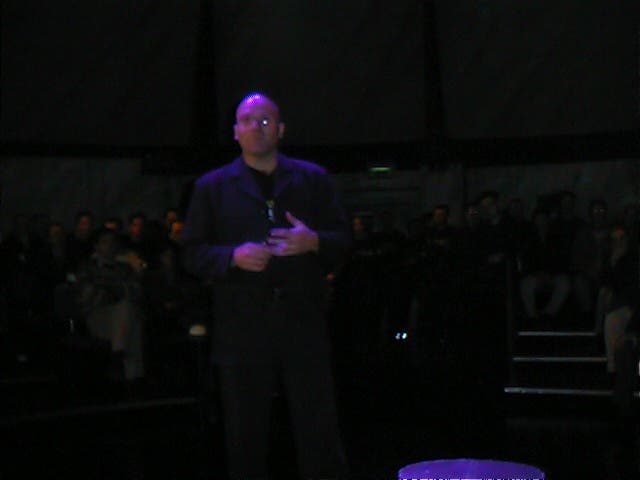Bruno Bonnell's speech at ETC 2000
Infogrames founder's speech from ETC 2k
Taking place at the National Center For Popular Music in Sheffield last Wednesday, the Emerging Technologies Conference 2000 gave some of the many developers who work for Infogrames the chance to catch up on the latest developments in PC hardware and Microsoft's DirectX API.
It also gave them the chance to meet their boss, flamboyant Frenchman Bruno Bonnell, who founded the company 16 years ago. And as one of the few journalists at the event (which was really geared towards developers rather than the press), EuroGamer's John "Gestalt" Bye was there to bring you some of the highlights of his speech and the question and answer session that followed...
Growth Industry
Infogrames is reportedly now the second biggest computer games publisher in the world, having taken over a number of ailing publishers in recent years, including Britain's Gremlin and America's Accolade.
Their most recent acquisition is GT Interactive, which has had a fairly poor time of it recently financially speaking, despite publishing hits like Unreal Tournament. So why take them over? Bruno explained that Infogrames' absorption of GT brings them "good distribution in the US, and contacts with developers in the US".
As a European company this is obviously important to Infogrames, and although they recently took over Accolade (the people behind the Test Drive series and Slave Zero amongst other games), clearly they didn't have the muscle and name recognition to give Infogrames quite the slice of the American market they were looking for...
With the addition of GT Interactive to Infogrames' rapidly growing empire, Bruno predicted that their revenues would reach $1bn next year - impressive for a company that was, until recently, a fairly minor player in the wider scale of things.
It's not just Infogrames that is growing though - Bruno compared the computer games industry of today to the movie industry of the 1920s, which would suggest we're just reaching the point of developing the gaming equivalent of "talkies" at the moment. He also said that, whereas DW Griffith was probably not thinking about the future of movies, Infogrames is very much looking to the future.

Platform Alteration
So what is that future? Well, Bruno was recently quoted as saying that "the PC is dead", and he took this opportunity to clarify that.
"I think the PC is dead. [The idea of] a single screen in the house doing everything from games to running washing machines is a dream". Instead computers will spread throughout the house in different forms, and from there will be a number of different platforms and appliances capable of running games.
Handhelds, or "nomadic toys" as Bruno calls them, will continue to develop. Already the GameBoy Colour is one of the most popular gaming platforms in the world, outselling the Playstation and Dreamcast, and Bruno promised that "Infogrames will be one of the leading publishers" in this area.
Then of course there are the consoles, dedicated gaming machines. Bruno believes that these will continue to exist in much the same form as they are at the moment for the next ten years at least, and again Infogrames will be supporting all the leading consoles, such as the Dreamcast and Playstation 2.
Despite his earlier comments, Bruno still sees a future for the familiar desktop computer, although it won't have as wide a market as many of the other platforms, and its online applications will become ever more important.
And finally there is digital TV, which is becoming increasingly more sophisticated, with Bruno telling us that "set boxes are moving into games as well".

The Future Of Games
Enough about the platforms, what about the games we will be playing on them?
Well, here again Bruno had a surprise for us, admitting that he thought that "most of gameplay is already invented", and that "basically the gameplay models are there". Games in the future will be less about coming up with a totally new form of gameplay, and more about "better, much more sophisticated, simpler games". Evolution rather than revolution.
In fact, there are a limited number of revolutions, with Bruno picking out the recent rise of 3D graphics as an obvious example. The one he saw as a future trend was voice communications in games, something that Microsoft covered in their DirectPlay briefing later that afternoon, and which we will be bringing you more information about on Monday as part of an article on DirectX.
If you think this makes the future of gaming sound rather dull though, you shouldn't worry. "There are only a few revolutions to come. But by digging in the gameplay of the past we can find a lot of fun. There is a lot of room for innovation. By improving what's gone before you are no degrading your business."
"Some people are obsessed with innovations only", Bruno suggested. They concentrate too much on trying to come up with a totally unique new form of gameplay, instead of improving an existing genre and creating their own unique characters and style.
Developers shouldn't be afraid of the mass market either. "Mass market is degrading my content, bullshit!" commented Bruno, picking out Unreal Tournament as an example of a game that has reached a mass market, based on an existing genre but with its own unique style, and bringing new ideas to the table to improve the existing formula.

Mass Production
Part of reaching a mass market is in the pricing of games though, and here Bruno had some radical ideas as well.
"I am a strong believer that the price [of games] needs to drop", Bruno said, suggesting that games will soon cost $20 or less, and pointing to the recent slump in prices for Playstation games as a sign of things to come.
Lower prices would mean more sales, but this isn't the only way of balancing the books. Bruno believes that if people were "more careful with the development budget, we could shave 20 to 30% off" the cost of developing a game.
When asked about the growing size of the teams needed to develop a game, Bruno answered that perhaps the games are getting too big! "How long, as an average, is our target going to play?" Bruno asked. "85% of people who have bought our games have not finished one. The ending is maybe seen by only 5% of people."
He believes that many players "may not have 50 hours to play on one game, but they may be interested to get 10 to 15 hours [of gameplay] for $20".
The idea would be to develop shorter, cheaper games, but without sacrificing quality. "The audience now is very sophisticated, [we are] not going back to average games", he insisted.
Conclusion
According to Bruno, "the industry is just beginning, [and] all these doors are waiting to be opened."
Infogrames already have around 1200 developers working for them in-house, as well as roughly fifty independent studios working on games for them. When asked about how he saw this figure growing in the future, Bruno told us that if all those doors open, Infogrames could be three to four times bigger in five years.
Game development is truly becoming an industry.

